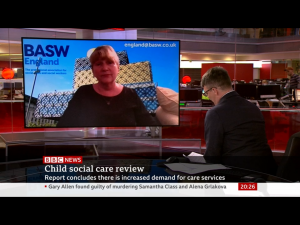The Case for Change - review of children's social care report
Maris Stratulis, BASW England Director - an initial BASW response
It is right the Case for Change report puts the voices of care experienced children and adults at the heart of this review and we must listen and hear the experiences of children and families.
300 contributors to the review are from a registered workforce of over 100,000 social workers. More must be done to grasp and fully understand the value and the importance that social workers bring in supporting children, families and young people.
Social workers are a workforce of committed individuals and teams working across communities carrying out demanding and often emotionally challenging work – their experiences, voices and needs must be recognised and listened to.

The report raises many fundamental issues of the environment social workers operate in, as well as social work practice itself.
One of the chief concerns it correctly highlights, and one BASW has been raising with the Government for many years, is the historical and current chronic underfunding of children’s social work and social care services.
The lack of funding, infrastructure and joined up co-ordinated integrated commissioning processes has also negatively shaped the way that services such as CAMHS are delivered.
This underinvestment undermines what the Government has said for many years, that it is prioritising the needs of children. Instead, a lack of central funding and the privatisation of children’s services has deprived the system of delivering crucial preventative and early intervention services.
The chair of the review previously committed to holding the government to account. However, there seems to be a lack of honest critique with either the current or previous governments. Instead, there are generic statements that no government has got this right.
This does not go far enough in challenging those in leadership, and ultimately their commitment to social justice, equality and human rights.
While the report rightly is unequivocal about the impact of cuts, ‘austerity’ is never mentioned, meaning the Government has been let off the hook for policy choices and reforms that has resulted in greater hardship for families.
The report also highlights the impact of poverty on children’s social care and the causal link between income, adversity and state intervention.
While the report raises these issues, it stops short of understanding the link between cuts, increasing poverty and year-on-year increase in overall referrals to children’s services since 2010.
Social Workers do not ‘investigate’ poverty but are acutely aware of children going hungry in a country where families are increasingly dependent upon food banks to survive.
Furthermore, the racial and intersectional disparities of children and families accessing support and being looked after is no accident, it reflects structural inequalities in this country.
Instead, the report leads specifically on the role of social workers and local children’s social care rather than taking a holistic national approach to looking after children, one that includes welfare, benefit policies, employment opportunities and housing solutions.
Looking after children is everyone’s responsibly and this once in a generation review must not lose sight of that.
The report delves into social work practice and raises questions around the culture of intervention, namely over social workers being risk adverse and suggesting too many Section 47 investigations are initiated.
While scrutiny of social worker practice is welcome, the Review needs to avoid reiterating a government ‘blame culture’ and negative narratives around a workforce that has tirelessly worked pre and during the pandemic to deliver support, compassion, kindness to children and families hand in hand with undertaking assessments and safeguarding investigations in challenging circumstances.
BASW is concerned as are many other organisations that there is a focus on the separation between support and assessment, which will support a pre-determined government strategy to reform children’s social work and social care, Children Act 1989, other domestic statute and regulations.
Ongoing review
It is concerning that the Case for Change skims over a children’s human rights-based approach, which should be the golden thread within which any review is conducted, as was seen in the Munro review.
A rights-based approach would ensure that all children under 18 are subject to nurturing, caring and support whereby their safety, wellbeing and ability to thrive are promoted; however, the reality is a lack of commitment to eradicate unregulated placements for 16 and 17 year olds, as well as inconsistent commitments to adult care leavers depending on the type of setting they resided in.
In the Coronavirus amendment regulations of 2020, the government promoted a narrative that streamlining bureaucracy was akin to diluting or removing children’s rights.
What is needed is both – a recognition of the importance of relationship-based practice (as promoted in BASW’s 80:20 campaign), which centres meaningful direct work as paramount, as well as a recognition that this must be founded on safeguarding hard-won rights.
The ongoing review must grasp and fully understand the value of this approach and the importance that social workers bring in supporting children, families and young people. This currently seems to be missing as only 300 contributors to the review are from a registered workforce of over 100,000 social workers.
Social workers are a workforce of committed individuals and teams working across communities carrying out demanding and often emotionally challenging work – their experiences, voices and needs must be recognised and listened to.